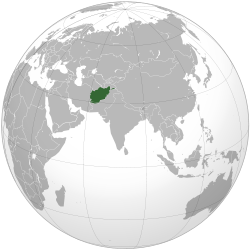Afghanistan Withdrawal: The Pros And Cons Of Using The Northern Distribution Network – Analysis
By Eurasianet
By Karimjan Akhmedov and Evgeniya Usmanova
US and NATO forces are expected to withdraw from Afghanistan by 2014, yet the logistics of removing military hardware from the country remain unresolved.
Ultimately, there is no easy way out for the arms and equipment. According to some estimates, up to 120,000 containers of military goods will need to be moved out of Afghanistan along with departing troops. The problem is both of the existing supply routes for Afghanistan – one via Pakistan, the other traversing Central Asian states – have their flaws and vulnerabilities. Thus, at a time when US and NATO planners place great value on reliability, they must contend with lots of uncertainty.

Right now, the Pakistani route would seem to hold the most risk. Tension between Washington and Islamabad over American drone strikes caused Pakistani leaders to close the supply route last fall. It reopened in July after protracted negotiations. But the thought still probably lurks in the back of many Pentagon minds: if Pakistan abruptly cut the supply line once, it could do so again.
That leaves Western diplomats having to count heavily on the Central Asian route, actually a web of air road and rail links, known collectively as the Northern Distribution Network (NDN). There’s concern surrounding the NDN too, but those concerns are mostly connected to money. Moving goods along the Central Asian route is estimated to cost 2.5 times more per container than it does on the Pakistani route. The added expense is what might be described as the price of enhancing the US and NATO role in Central Asia.
Not surprisingly, Central Asia experienced a summer full of diplomatic activity, underscored by US Assistance Secretary of State Robert Blake’s August 15-18 trip to Uzbekistan. All the diplomatic attention is aimed at cementing the support of Central Asian leaders for NDN’s shift into reverse gear.
It’s not that Central Asia’s authoritarian leaders need much convincing; they have already signaled their willingness to cooperate. For them, the diplomatic game seeks to gain the greatest possible economic and political dividends from the withdrawal of coalition troops.
When it comes to Central Asia, vanity, hypocrisy, thirst for money and power are inherent attributes of regional leaders, and these factors tend to influence the decision-making process.
Uzbekistan’s recent withdrawal from the Collective Security Treaty Organization (CSTO) stems largely from President Karimov’s desire to position Uzbekistan as an independent, and most importantly, the leading player in the logistics of the northern supply route. Tajik President Imomali Rahmon’s delay in signing a treaty on the presence of Russian military bases in Tajikistan also stems from his desire to obtain finances and hardware via an NDN transit deal.
From the perspective of American and NATO planners, these recent actions shouldn’t be seen as reassuring. The Uzbek and Tajik moves merely expose the fickle nature of Central Asian leaders. And even though Central Asian states occasionally thumb their nose at Moscow, the Kremlin still has lots of ways to make disobedient leaders pay for not taking Russia’s preferences into account.
It is worth noting at this point that the Russian Foreign Ministry is not thrilled with Washington’s current Afghan withdrawal timetable. Russian officials feel the Afghan government is not yet able to ensure security. Aware that Central Asia’s borders are porous, Moscow fears for its own stability if Afghanistan is left to its own devices.
Russia sees the US and NATO as defaulting on the UN Security Council mandate that authorized the presence of an international stabilization force in Afghanistan. This displeasure could have an impact on NDN withdrawal operations, due to the fact that the route runs through Russia. If needed, Moscow could use the NDN as a foreign policy tool to exert pressure on the United States and the Atlantic Alliance.
Finally, let’s not forget about the potential political fallout associated with NDN. Should the deal go through, the US and NATO would find themselves in an awkward position for having signed agreements with authoritarian regimes. Tajikistan and Uzbekistan will hold presidential elections in 2013 and 2015, respectively, and these countries’ leaders will certainly use the present situation to advance their own political ends. NDN, then, will undermine hopes for democratization in Central Asia and re-stir the international debate over double standards in US and NATO policies.
Karimjan Akhmedov is presently the CEO of the DF World Inc. (Canada). He is a former deputy minister of economy in Tajikistan. Evgeniya Usmanova is a Eurasia specialist with a particular interest in Central Asia.
